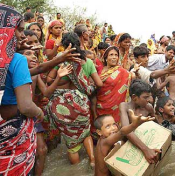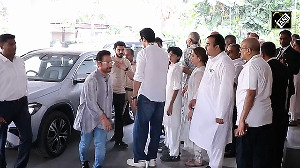 A principle adopted to ensure rehabilitation of evacuees alongside progress on projects is known for violations, says Sreelatha Menon.
A principle adopted to ensure rehabilitation of evacuees alongside progress on projects is known for violations, says Sreelatha Menon.
When construction of a dam is delayed, it leads to cost over-runs. It delays development. We are constantly told this, with much statistics.
When people living in submergence areas of dams under construction are not given alternative accommodation and farm lands for years after the deadline, does anyone calculate the cost overruns? The cost of lost livelihoods, lost farm lands, lost academic years, lost mental peace?
The Ministry of Water Resources and the Ministry of Environment and Forests, and state governments, have now developed a chronic habit of providing "conditional clearances" for dams and power projects. The condition being that the displaced would be compensated pari passu, or alongside the construction.
Pari passu (which actually means equally and without preference) is a blessing for builders who violate it and a curse for the poor villagers who have to live the rest of their lives caught between the unkept promises of builders and state governments and agitations by various people's movements.
No one keeps count of the cost over-runs of these poor villagers or compensates them. Take the example of the Sardar Sarovar project. It is complete, the gates have been built and the only thing left to be done is to erect and close these.
But, till date, the Madhya Pradesh government has not provided the land that was promised to the submergence villages. This despite the fact that the Narmada Disputes Tribunal Award has said that no piece of land can be submerged unless people are given alternative land.
The erection of gates can happen the moment it gets clearance from two sub-committees of the Narmada Control Authority, the rehabilitation panel and the environment clearance panel. Both are biding their time, probably fighting pressure to give the go-ahead, even as Home Minister P Chidambaram and now Congress President Sonia Gandhi are talking of a trust deficit.
Case two: Maheshwar has come up as a classic case of violation of the pari passu clause. The villages in submergence areas were to be shifted and given alternative land soon after the construction started. Today, the construction is 87 per cent complete and people of only one out of 20 villages have got compensation.
Environment Minister Jairam Ramesh tried to stop the work but technical reasons provided by the Central Water Commission, besides pressure from the Madhya Pradesh government, compelled work to resume partially. Unfortunately, there is no central people's commission to speak for the people's rights.
Sanjay Parikh, the Supreme Court lawyer fighting cases for the Narmada Bachao Andolan, says the court has never stopped work for violation of the pari pasu clause. The day that happens, violations would stop.
Says Sripad Dharmadhikary, author of "Unravelling Bhakra" and "Mountains of Concrete", another study of dams in the Himalayas: "Pari passu is a step backward, as it puts rehabilitation of a displaced person on the same level as construction of a structure."
The problem is not with pari passu itself, says Dharmadhikari. It is a matter of implementing it properly. The solution is to embed the rehabilitation in the design of any project and to get the rehabilitation policy right, with monitoring and enforcement mechanisms.
Ramaswamy Iyer, former secretary to the Ministry of Water Resources, has in his writings traced the pari passu approach to himself. He said it was adopted in Narmada cases, in the belief that conditional clearance would work, despite opposition from the then environment secretary, T N Seshan. Today, Iyer regrets it.
For, today it is an instrument to cheat people. That deficit in pari passu leads to deficit in trust and revolt.








 © 2025
© 2025